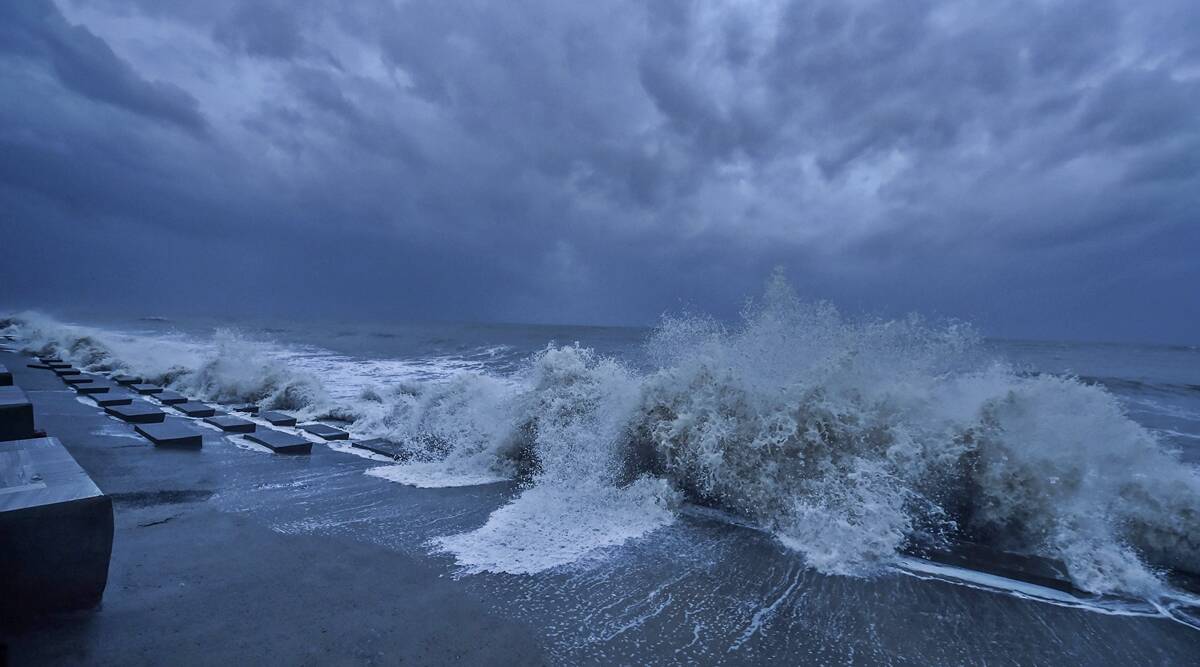 The report stated that the relative sea level in the Indian Ocean, around Asia, has increased faster than the global average, with coastal area loss and shoreline retreat. (File photo)
The report stated that the relative sea level in the Indian Ocean, around Asia, has increased faster than the global average, with coastal area loss and shoreline retreat. (File photo) Increasing heat waves and droughts, increased rainfall events and more cyclonic activity are likely to occur across India and the subcontinent over the next few decades, stated the Inter-governmental Panel on Climate Change (IPCC) Working Group-I report released on Monday.
The first part of its Sixth Assessment Report (AR6) titled ‘Climate Change 2021: the Physical Science Basis’, which has been finalised by scientists in collaboration with 195 governments, also stated that heatwaves and humid heat stress will be more intense and frequent during the 21st century. Both annual and summer monsoon precipitation will increase during this century, with enhanced interannual variability, it further added.
For the Indian subcontinent, the report stated, “the observed mean surface temperature increase has clearly emerged out of the range of internal variability compared to 1850-1900. Heat extremes have increased while cold extremes have decreased, and these trends will continue over the coming decades.”
Average and heavy precipitation will also increase over much of Asia, it added.
The report stated that the South and Southeast Asian monsoon has weakened in the second half of the 20th century mainly due to the increase in aerosols and particulate matter due to human activity. The dry-north and wet-south pattern of East Asian summer monsoon precipitation changes are results of the combined effects of greenhouse gases and aerosols, it said.
It also stated that South and Southeast Asian monsoon and East Asian summer monsoon precipitation will be dominated by the effects of internal variability in the short term and precipitation will increase in the long term. Agricultural and ecological droughts are also expected to increase in the subcontinent, it added.
Dr. Friederike Otto, who is the Associate Director of the Environment Change Institute, University of Oxford and one of the authors of the report, said, “The key finding of the report is that climate change is a fact, global warming is a fact and that the warming has taken places because of human influence is now well established. We have seen rapid changes across the world, with heat waves, heavy rainfall events droughts and compound events — or a mix of hot, dry and windy — preconditions for forest fires. We see this in every region of the planet. There is no going back from some of these changes. Even if we limit temperatures to 1.5 degrees Celsius from pre-industrial levels, we will continue to see extreme weather events.”
Dr. Otto added that some changes are locked in, such as rising sea levels and melting glaciers, which can now no longer be reversed. “For India, increase in heatwaves is marked by other emissions like aerosol emissions. If there is a reduction in aerosols, we will see a further increase in heat waves,” she said.
IITM’s Dr. Swapna Panickal, another author of the report, said that India will experience an intensification of the water cycle which will affect rainfall patterns as well as increased monsoon precipitation.
“In the Indian Ocean, the sea temperature is heating at a higher rate than other areas, and therefore may influence other regions. The Southwest Monsoon has declined over the past few decades because of the increase of aerosols, but once this reduces, we will experience heavy monsoon rainfall,” she said.
The global mean sea level in the Indian Ocean is rising at 3.7 meters annually, she said, adding that extreme sea level events that previously occurred once every 100 years, will now be seen nearly every year.
The report stated that the relative sea level in the Indian Ocean, around Asia, has increased faster than the global average, with coastal area loss and shoreline retreat. The Regional mean sea level will continue to rise, it added.
The report projected that in the coming decades climate changes will intensify across regions. For 1.5°C of global warming, there will be increasing heat waves, longer warm seasons and shorter cold seasons, it stated. At 2°C of global warming, heat extremes would more often reach critical tolerance thresholds for agriculture and health, it added.
Climate change is intensifying the water cycle, which brings more intense rainfall and associated flooding, as well as more intense drought in many regions, the report stated. It is also affecting rainfall patterns. In high latitudes, precipitation is likely to increase, while it is projected to decrease over large parts of the subtropics, the report stated.
It further stated that coastal areas will see continued sea level rise throughout the 21st century, contributing to more frequent and severe coastal flooding in low-lying areas and coastal erosion. For cities, some aspects of climate change may be amplified, including heat (since urban areas are usually warmer than their surroundings), flooding from heavy precipitation events and sea level rise in coastal cities.
Dr. Arunabha Ghosh, CEO, Council on Energy, Environment and Water (CEEW), said, “Given that India is one of the most climate-vulnerable countries, we must recognise that even geographically faraway climatic changes can have consequences for our monsoons and intensity of extreme events. Our focus should be on building climate-resilient physical and digital infrastructure along with inculcating social and behavioural changes in citizens and communities. Further, it should nudge the international community to capitalise a Global Resilience Reserve Fund to help lower the peaks of climate risks for the most vulnerable countries and create an insurance cushion against severe climate shocks.”
- The Indian Express website has been rated GREEN for its credibility and trustworthiness by Newsguard, a global service that rates news sources for their journalistic standards.

